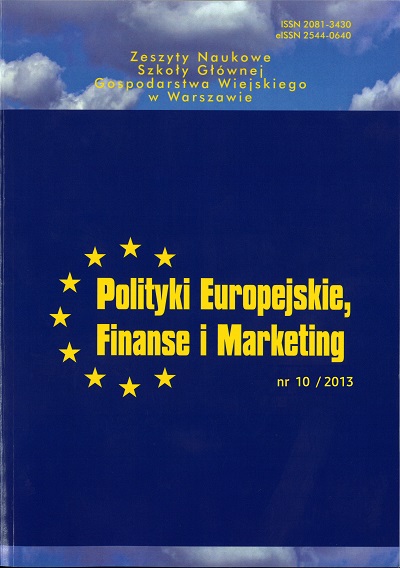Main Article Content
Article Details
Anon., Analizy, badania, raporty. Spożycie alkoholu. Państwowa Agencja Rozwiązywania Problemów Alkoholowych. Dostępne: http://www.parpa.pl/index.php?option=com_content&task=view&id=156&Itemid16, data aktualizacji: 22.01.2013.
Anon., European School Survey Project on Alcohol and Drugs, The 2011 ESPAD report. Dostępne: http://www.espad.org/en/Reports--Documents/ESPAD Reports/, data aktualizacji: 22.01.2013.
Cismaru M., Lavack A.M. i Markewich E.: Alcohol Consumption Among Young Consumers: a Review And Recommendations, Young Consumers, Vol. 9, Issue 4, 2008, s. 282-296. (Crossref)
Cismaru M., Lavack A.M. i Markewich E.: Social Marketing Campaigns Aimed At Preventing Drunk Driving: a Review And Recommendations, International Marketing Review, Vol. 26, Issue 3, 2009, s. 292-311. (Crossref)
Gunter B., Hansen A. i Touri M.: Alcohol advertising and young people's drinking, Young Consumers, Vol. 10, Issue 1, 2009, s. 4-16. (Crossref)
Hastings G. i Angus K.: When is social marketing not social marketing? Journal of Social Marketing, Vol. 1, Issue 1, 2011, s. 45-53. (Crossref)
Hill S.C., Thomsen S.R., Page R.M. i Parrott N.: Alcohol Advertisements In Youth-oriented Magazines: Persuasive Themes And Responsibility Messages, American Journal of Health Education, Vol. 36, Issue 5, 2005, s. 258-265. (Crossref)
Korff R.: Local Enclosures of Globalization. The Power of Locality, Dialectical Anthropology, Vol. 27, 2003, s. 1-18. (Crossref)
Lefebvre R.C.: An integrative model for social marketing. Journal of Social Marketing, Vol. 1, Issue 1, 2011, s. 54. (Crossref)
Makara-Studzińska M. i Urbańska A.: Binge drinking patterns among young people from rural areas of Lublin province, Annals of Environmental and Agricultural Medicine, Vol. 14, 2007, s. 45-49.
Manoff R.K.: Social Marketing: ANew Imperative for Public Health, Praeger, New York 1985.
Park C.L.: Positive And Negative Consequences Of Alcohol Consumption In College Students, Addictive Behaviors, Vol. 29, 2004, s. 311-321. (Crossref)
Siemieniako D.: Społeczno-kulturowe czynniki lojalności konsumentów alkoholu, Marketing i Rynek, PWE, 2013 (artykuł zgłoszony do publikacji).
Siemieniako D, Kubacki K.: Exploring college students' perceptions of negative consequences of binge drinking through consumer collages, European Advances in Consumer Research, Vol. 9, 2011, s. 255-263.
Siemieniako D., Kubacki K., Krot K. i Glińska E.: The ethnocentric tendencies amongst beer drinkers as a specific relationship with local brands in Poland, British Food Journal, Vol. 113, Issue 3, 2011, s. 404-418. (Crossref)
Siemieniako D., Rundle-Thiele S. i Urban W.: Understanding loyalty from a customer's perspective, Journal of Customer Behaviour, Vol. 9, Issue 3, 2010, s. 283-298. (Crossref)
United States Agency for International Development: Private sector health glossary. Dostępne: http://psp-one.com/section/resource/glossary, data aktualizacji 19.10.2010.
Wechsler H. i Nelson T.F.: What we have learnt from the Harvard School Of Public Health College alcohol study: focusing attention on college student alcohol consumption and the environmental conditions that promote it, Journal of Studies on alcohol and Drugs, Vol. 69, Issue 4, 2008, s. 1-10. (Crossref)
World Health Organization, Working document for developing a draft global strategy to reduce harmful use of alcohol. Dostępne: http://www.who.int/substance_abuse/activities/msbwden.pdf, data aktualizacji: 15.10.2010.
Wymer W.: Developing more effective social marketing strategies. Journal of Social Marketing, Vol. 1, Issue 1, 2011, s. 17-31. (Crossref)
Downloads
- Alicja Sekuła, Możliwości zastosowania standardowych narzędzi promocji w marketingu miejsca , Zeszyty Naukowe SGGW, Polityki Europejskie, Finanse i Marketing: Nr 10(59) (2013)
Możesz również Rozpocznij zaawansowane wyszukiwanie podobieństw dla tego artykułu.

Utwór dostępny jest na licencji Creative Commons Uznanie autorstwa – Użycie niekomercyjne 4.0 Międzynarodowe.





